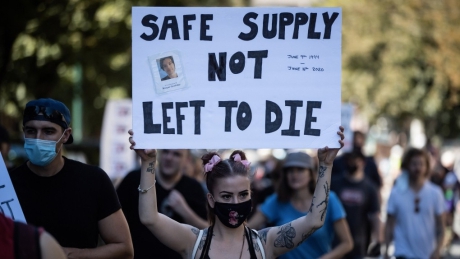Features
You are here
BC government prepared to let thousands more die

January 23, 2024
13,317 people, and counting, have died of unregulated, toxic drugs since the province of British Columbia declared a public health emergency in April 2016.
At the end of 2023, six people die each day in BC from unregulated, toxic drugs.
Drug toxicity and overdose is the leading cause of death for ages 10 to 59 in British Columbia.
“It’s unfortunate because they were providing essential life-saving work. But they were also breaking the law, which we will not tolerate.”
That was British Columbia Premier David Eby on October 24, 2023 as he responded to a query about the cancellation of a Vancouver Coastal Health contract with the Drug User Liberation Front, known colloquially as DULF.
The next day, October 25, the Vancouver Police raided the work spaces of DULF and arrested two co-founders, Eris Nyx and Jeremy Kalicum.
Why did DULF have their contract cancelled, their work spaces raided, and their co-founders arrested? Well, because during a poisoned drug crisis that has killed over 13,317 people since April 2016, DULF had the audacity to provide a safe supply of cocaine, methamphetamine, and heroin to the 47 members of their compassion club.
For over a year, DULF had been purchasing drugs on the dark web, sending those drugs to labs at the University of British Columbia and the University of Victoria for testing; then selling those drugs, at cost, to their compassion club members. They stepped up to provide safety and security for a group of people who use drugs. A group that the NDP government of British Columbia will only pay lip service to.
There are over 225,000 people in British Columbia who use unregulated, and potentially toxic, drugs according to the BC office of the Chief Coroner. Fewer than 2.25% percent of those people have a prescription to receive safe supply in any given month. And yet, "Non-prescription models for the delivery of pharmaceutical alternatives are not under consideration," according to BC’s Minister of Mental Health and Addictions. Jennifer Whiteside. The NDP have refused to consider any expansion of programs that would transition the province to a non-prescriber model for providing safe drugs to users. They continue to insist on the medical system, a profession that cannot help but reflect the classist and ableist attitudes of broader society, as the gatekeepers of morality and the arbiters of who is worthy to receive potentially life saving prescriptions.
On January 31, 2023 the province of British Columbia decriminalized the possession of some drugs, including opioids and methamphetamine, up to a certain cumulative total. It was a pilot program with a lot of issues, but it was also potentially the beginning of a challenge to the status quo war on drugs. In the eleven months since then there has been a continued growing backlash against safe supply as well as burgeoning outrage towards public drug use. The proselytizing is growing in strength, in column inches, and falls from the lips of Federal Conservative leader Pierre Pollievre, BC United leader Kevin Falcon, and former RCMP spokesperson turned BC United MLA Elenore Sturco, among others. Their regurgitated drug war rhetoric has succeeded in producing a moral panic that now threatens the lives of some of the most vulnerable members of our society.
On November 8, 2023 the BC NDP passed Bill 34 in response to that growing right-wing chorus. This bill criminalizes the public use of illicit drugs, expressly allows police to engage with people perceived as high or using in public, and rolls back the gains made under the province’s decriminalization program.
They did this without any plan to add more overdose prevention sites, provide housing for people who don’t have it, or to provide truly accessible safe supply. People use drugs in public because they are afraid they might die in private. Or because they don’t have a private residence to retreat to. The NDP has backed the emotions and prioritized the comfort of those who don’t use drugs because they need their votes and their economic contributions to perpetuate the system they have built.
Less than a week after the passage of Bill 34, Harm Reduction Nurses Association launched a legal challenge at the British Columbia Supreme Court. “It’s time to stop stoking fear and listen to people who have solutions – people who use/d drugs, harm reduction workers, policy experts, nurses and caregivers, all of whom are ready and waiting for this government to support policies and services that would see an end to this devastating public health emergency." On December 29th, HRNA secured an interim injunction that temporarily blocked the implementation of the bill until at least March 31st. They won this battle, this injunction, and that is incredible. It will save lives. It is a victory for people who use drugs, especially those who also face intersecting traumas of homelessness, poverty, and racism. However, the war on drugs and drug users continues.
Garth Mullins is a member of the Vancouver Area Network of Drug Users. He recently spoke to freelance journalist Dustin Godfrey for an article that was published in The Maple and said this about the advancement of drug user rights, “it gets advanced by us fighting in the streets, and where necessary, using civil disobedience to get us there. That means breaking unjust laws.”
Safe Supply Now.
Free DULF.
Section:
Topics:










